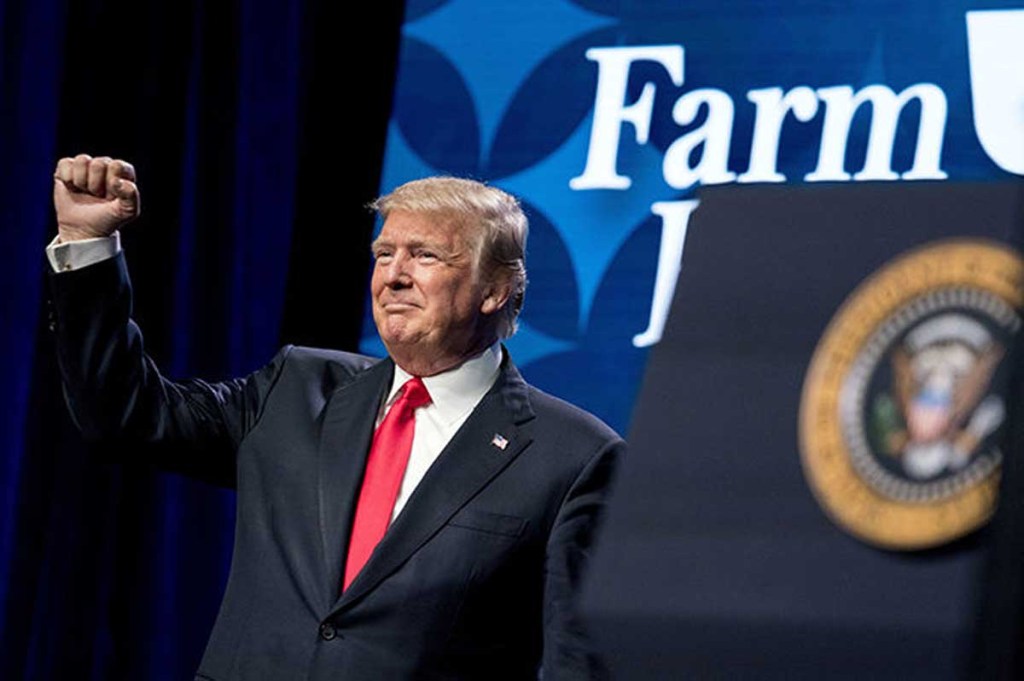Farmers hold out hope for increase in exports
Published 5:15 am Tuesday, January 9, 2018

- President Donald Trump pumps his fist after speaking at the American Farm Bureau Federation's Annual Convention at the Gaylord Opryland Resort and Convention Center, Monday, Jan. 8, 2018, in Nashville, Tenn.
NASHVILLE — Farm leaders from across the nation expressed their concerns during the annual meeting of the American Farm Bureau Federation (AFBF) about how the Trump administration will deal with farm trade issues in 2018.
Farmers, a key component of Trump’s rural base, have generally been pleased with the administration’s tax-lowering, regulation-cutting policies. But the president’s position toward income-boosting farm exports raises unanswered questions.
Trump gave little attention to trade pacts in his speech to the farm group, only saying that he is working to improve the North American Free Trade Agreement.
In the past, the president has argued that trade agreements between the U.S. and trading partners have disadvantaged this nation.
One of the first acts of the Trump administration was withdrawal from the 12-nation Trans-Pacific Partnership (TTP) last January.
But farmers insist that their prosperity depends, in large part, on feeding the 95 percent of people living outside the U.S. Farm exports are now responsible for 20 percent of American farm income, according to the U.S. Department of Agriculture.
Alabama is the nation’s second-largest exporter of poultry products and a major exporter of beef, two commodities that benefit dramatically from major U.S. trade agreements. Locally, Cullman County has the second-largest cattle herd in the state.
The North American Free Trade Agreement (NAFTA), a two-decade trade pact between the U.S., Canada and Mexico, is now under renegotiation forced by the Trump administration.
Winston County farmer Darrell Lee, a cow-calf producer, said he supported Trump’s comments but said, “We definitely need to be on a level playing field with other countries.”
President Trump has threatened to withdraw from NAFTA. The administration has been renegotiating the deal for nearly five months, with the first five rounds seeing no progress. The sixth and final round of talks is scheduled Jan. 23 in Montreal.
Canada and Mexico are the nation’s number two and three largest buyers of farm products, respectively. NAFTA withdrawal would result in a net loss of at least 50,000 jobs in the farm industry and a drop of $13 billion in the farm sector alone, according to an October letter from 85 food and farm groups to Commerce Secretary Wilbur Ross.
At least as important for Alabama is the Korean Trade Agreement (KORUS), affecting America’s sixth-largest export market. In an April interview, Trump called KORUS a “horrible deal” that has left America “destroyed.”
Under KORUS, the U.S. beef industry has seen an 82 percent increase in annual sales to South Korea, making the nation the second-largest market for U.S. beef. South Korea is also the 10th-largest market for U.S. poultry and eggs.
Chris and Monica Carroll, a farm couple from Ozark, raise both cattle and poultry. While optimistic about the future of farm trade, the couple feels that the quality of American farm products should be allowed to carry significant weight in any future trade negotiations.
Farmers say Alabama farm exports are not just important to agriculture. The total impact of a healthy farming and forestry industry to Alabama is $70.4 billion, and the industry supports 580,295 jobs, according to Auburn University.
Dennis Vercler is retired director of news and communications for the Illinois Farm Bureau. He has lived near Crane Hill since 2012.





